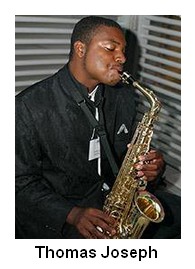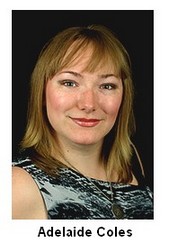
ReviewsODU Student Composers in Concert: An Evening of New Music For several months we had been anticipating this chance to hear music composed by current students and graduates of Old Dominion University in live performance. In a delightful and diverse evening we heard, in alphabetical order, music composed by J.P. Allgood (b. 1993), Adelaide Coles (b.1991), Morgan N. Hatfield (b.1990), Thomas Joseph (b.1988), Manny Hernandez II (b.1984) and David Nguyen (b.1990). The student composers organized the concert, paid the performers when necessary and advertised the event. The university provided the ideal venue for this chamber music performance. The program opened with Music for a Winter Wedding (2013)by Morgan Hatfield, a current ODU composition student who has studied with Dr. Adolphus Hailstork since 2010 and who will graduate in May 2014. His Music for a Winter Wedding is a lilting, infectious tune that occasionally dips briefly into a dark side. It seemed a perpetual round played by the Governor’s School for the Arts String Quartet. The friendly, brisk opening is followed by varied textures with the feel of an old fashioned fiddle tune of the Stephen Foster era but with modern influenced variations. Hatfield’s art song for solo singer and piano, planned for later in the program, O’ God (2013) had to be cancelled because his fiancée, contralto Katherine Rideout was indisposed. He was to have been the pianist. Saloon Miniatures (2013) for piano by J. P. Allgood, a sophomore studying music composition with Dr. Andrey Kasparov and French horn with Professor Marlene Ford, was performed by the talented ODU student Beth Anne Jacob. Previously we had heard the piece in its November 18, 2013 premier performance also performed by Ms. Jacob at the ODU New Music Ensemble program directed by Dr. Kasparov. I.) Nocturne’s polyrhythms blended a rag into the tune that began to swing only to have the music suddenly head into a different direction, as if by tending toward sentimentality it hit a roadblock. II.) Rag had the feeling of a clumsy, young man dancing, tripping from time to time, only for it all to come out right at the end. It was great fun to hear, and a real, but well-met challenge for Ms. Jacob. A bright, staccato trumpet played by composer Manny Hernandez with Beth Anne Jacob at the piano opens his Chaotic Grace (2013). The trumpet, now muted offers an understated 4 A.M. moody section followed by the open, strangled screams of the trumpet which on repeats, mellows. Ms. Jacob was a worthy partner in this piece that offered so many ideas and moods in a short work that feels somehow unfinished. Mr. Hernandez received his undergraduate degree from Norfolk State University before he studied arranging and orchestration at ODU in 2009. In addition to performing with the 380th Army Band in Richmond where he plays trumpet and French horn, he teaches trumpet, saxophone, French horn, trombone and piano and is a vocalist and was recently hired to coordinate music entertainment for Beach Street USA at the Virginia Beach oceanfront.
Mr. Joseph’s second piece, Trombone Beast Suite (2013) whimsically deals with the fact that the composer, who is a brass player, thinks of this instrument as “a beast, a monster, a force to reckon with.” Dr. Mike Hall, trombone and Dr. Stephen Coxe, piano, played the five movement piece. I.) Tempered Beast explores the potential energy and power. II.) Wild Beast has many quick duo notes that have a hard-edged glitter that softens into a mournful cry. In III.) Sleeping Beast, Mike Hall’s breath rattles into the trombone, somber and quiet with tinkling piano. Snoring, snuffling notes were concluded with power piano chords and elongated trombone lines that sounded like a deflating balloon. The skipping duet in IV.) Naughty Beast is quite a romp. At the end Mike Hall wags his finger at the audience, warning us. V.) Raging Beast opens with a steady rhythm and an explosive expression of power, strength and ferocity. The third Thomas Joseph piece was Impromptu for Trumpet (2010) played by Jimmy Whittemore. The clear, open sound of the trumpet is followed by a sweetened, muted section. Another open section was followed by a squeezed, pinpoint sound using a different mute. The conclusion is a mellow, open legato. The piece was played with great skill and explores tone differences in muting register choices and ranges from fanfare-like to swift and agile, to slow and expressive as if it were a cadenza improvised on the spot by a Baroque performer. We recently heard a fourth piece by Mr. Joseph. His Music for Clarinet and Piano was presented on November 18, 2013 as part of the ODU New Music Ensemble concert mentioned earlier. Clarinetist Sarah Bass and Dr. Kasparov on piano performed this piece that uses the two instrumentalists interacting as equal partners, each enriching the other’s sound. They explored “solemn suspense, whimsical charm, a dreamlike soundscape, and an introspective conclusion.” Mr. Joseph has a catalogue of more than 80 pieces, lives in Virginia Beach and has a deep commitment to his art. His website is thomasjosephmusic.com. We heard her Quartet for December (2013), I. Poco Adagio-Allegro movement played by the GSA String Quartet—violins Ryan Tolentino and Noemie Chemali; viola, Andre Magalhaes; violoncello, Tyler James. Ms. Coles has described the piece: Quartet for December is a four-movement work commemorating the marriage of a dear friend. The first movement, Poco Adagio—Allegro, begins with a pensive violin solo, then gains momentum and takes off into a rollicking dance in 7/8 meter. The dance is based around the melodic contours of the violin solo and the rhythmic interplay between the four instruments, oftentimes with duets and trios in opposing metric divisions. A sudden sforzando outburst of pent-up fire leads the way to a sultry section characterized by luscious harmonies and chromatic motion. Then the mood brightens to cheerful innocence and, following a brief echo of the opening violin solo, a recap of the dance. The dance is now faster and more acrobatic. Everything nearly spirals out of hand when the harmonies metamorphose to minor and all four instruments intensify their sforzando rattlings more and more. The tension eases a final time, and a synthesis of the preceding themes winds the movement down to a restrained conclusion. We recently learned that Adelaide Coles is one of three finalists for an Australian national composition contest, the Fairweather Prize. The first movement of her string quartet will be premiered by the Acacia Quartet on April 30 in Sydney. The winner of the Fairweather Prize will receive a $2000 cash prize and be on the list of 101 compositions commissioned for the 100th anniversary of the Sydney Conservatorium of Music, which includes pieces by Carl Vine, Arvo Part, Aulis Sallinen, and Peter Sculthorpe. For more information visit http://music.sydney.edu.au/study/fairweather-family-prize-student-composers/ The Coles quartet created a somber soundscape making a strong emotional impact on this listener, especially the wild strikes of the bow on strings by cellist Tyler James. Ms. Coles’ second piece, Acquainted with the Night, uses a Robert Frost poem. The poem speaks of a man who walks out at night, sometimes in the rain, beyond city lights and has seen sad city lanes. He has stopped and listened to the night and heard an interrupted, faraway cry and he has experienced the grandeur of an illuminated sky. The feeling tone of the poetry was all there in Ms. Coles’ setting. The deep bass voice of Monte Gammon with pianist Sara Cramer brought this unsettling text to life. Later in the program, Capriccio for Flute and Piano featured Patti Watters, flute and Mr. Coxe on piano—think of Poulenc’s chamber music palette and expand its harmonic language for the piano. Ms. Coles' comments about the performance expand the listeners knowledge of the relationship of composer to performers: David Nguyen graduated from ODU with a Bachelors in Music Composition in December, 2013. He studied with Dr. Mark Chambers and Dr. Andrey Kasparov and “believes that new music is the sounds of the world around us and that people should try to understand its language.” First we heard his Perceptive Fragments for Solo Flute and Electronics (2013). He used a cutting-edge, flexible, modular, but extremely difficult-to-master electronics software program to process the sound of the flute played by Virginia Symphony player Ya-ching Chen. The flute sound was enhanced by bubble-like fragments that seemed to adhere to the live sound. Some of the unnatural tones created are charming, others confrontational, others quite high-pitched overloads that are purely electronic. Ms. Chen’s consummate playing ends in a singing, slightly eerie but lovely sound. The concluding piece, Indelible (2013) for solo cello was played by Jacob Fowler. The score was spread over three music stands and the music sounded as if it had been electronically processed. Actually, all of the sounds were produced by the greatly talented cellist. A dutt, dutt sound was created by sliding the bow up strings, fingers slide up strings, fingertip touches in little patterns, taps on the body of the cello, plucked strings and an alarming whistling sound. Once the sound palette vocabulary was defined I closed my eyes and let the sounds wash over me. More dramatic rhythms were patted out and lyrical phrases were repeated again and again. The experience was amazing. An unamplified traditional instrument, a sensitive performer and the creative young composer made magic. David was accepted into Masters of Music programs at both the Jacobs School of Music at Indiana University and the University of Illinois School of Music at Urbana-Champaign and will be commencing his studies in the fall. Printer Friendly Format
|
 Three pieces by recent ODU graduate Thomas Joseph were featured. Solitude (2013) was played by Pete Echols on euphonium with its deep, mellow sound. The pacing in the piece was meditative and the feeling to me was sad and lonely. Mr. Joseph’s program notes confirm this: “Solitude deals with the emotions of isolation including loneliness, depression, anger, sadness, hopelessness, nostalgia and fear. Instead of being episodic these emotions and dark feelings coincide with one another.”
Three pieces by recent ODU graduate Thomas Joseph were featured. Solitude (2013) was played by Pete Echols on euphonium with its deep, mellow sound. The pacing in the piece was meditative and the feeling to me was sad and lonely. Mr. Joseph’s program notes confirm this: “Solitude deals with the emotions of isolation including loneliness, depression, anger, sadness, hopelessness, nostalgia and fear. Instead of being episodic these emotions and dark feelings coincide with one another.”  Speaking of determination in becoming a composer, Adelaide Coles, who graduated summa cum laude with a bachelor’s degree in composition from ODU in December 2012, is in Sydney, Australia pursuing a Masters of Music in composition at the Sydney Conservatorium of Music.
Speaking of determination in becoming a composer, Adelaide Coles, who graduated summa cum laude with a bachelor’s degree in composition from ODU in December 2012, is in Sydney, Australia pursuing a Masters of Music in composition at the Sydney Conservatorium of Music.